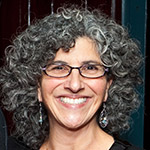

Julie Drizin, director at the center.
The nonprofit Journalism Center on Children & Families, a go-to resource for journalists for two decades, will close at the end of 2014 because it will run out of funding.
In a letter posted on the center’s website that begins “Dear Friend of JCCF,” the center’s director, Julie Drizin, expressed “great sadness” about the impending closing of the center, based at the University of Maryland’s Philip Merrill College of Journalism.
“The [journalism] college has concluded that this center is not sustainable in the current economic climate,” Drizin wrote in the letter, dated Wednesday. “Indeed, these are very challenging times in the worlds of journalism and education.”
The Baltimore-based Annie E. Casey Foundation started JCCF at the UM journalism school 20 years ago as the Casey Journalism Center.
“For the past two decades, JCCF has helped inspire, support, spread and reward excellent reporting on kids,” Drizin said in the letter. “We’ve trained and assisted hundreds of journalists in every kind of media in every part of the U.S.”
Drizin, who became the center’s director three years ago, has served as an award-winning producer of public radio news, public affairs and talk programming with numerous news organizations including National Public Radio and Pacifica’s “Democracy Now.” She also teaches a course at UM’s journalism college on covering issues affecting children and families.
During her tenure, Drizin expanded the Casey Medals Program, recognizing journalistic excellence and launched a new website.
This year, JCCF administered a journalism fellowship and scholarship competition for the Marguerite Casey Foundation and created LIFELines: Stories from the Human Safety Net, an original reporting project set to launch in a few weeks.
Drizin said she’s particularly proud of having persuaded editors of the influential Associated Press Stylebook to urge news outlets to no longer use the offensive term “illegitimate children.”
In her letter, Drizin said, “It’s been especially rewarding teaching my students that compassion and empathy are as important in journalism as in life.
“Keep fighting for the air time, the word count, the column inches and the resources to deliver stellar reporting about children, youth and families,” she urged journalists. “Keep building bridges with youth media in your communities. Keep telling stories that change lives.”

























